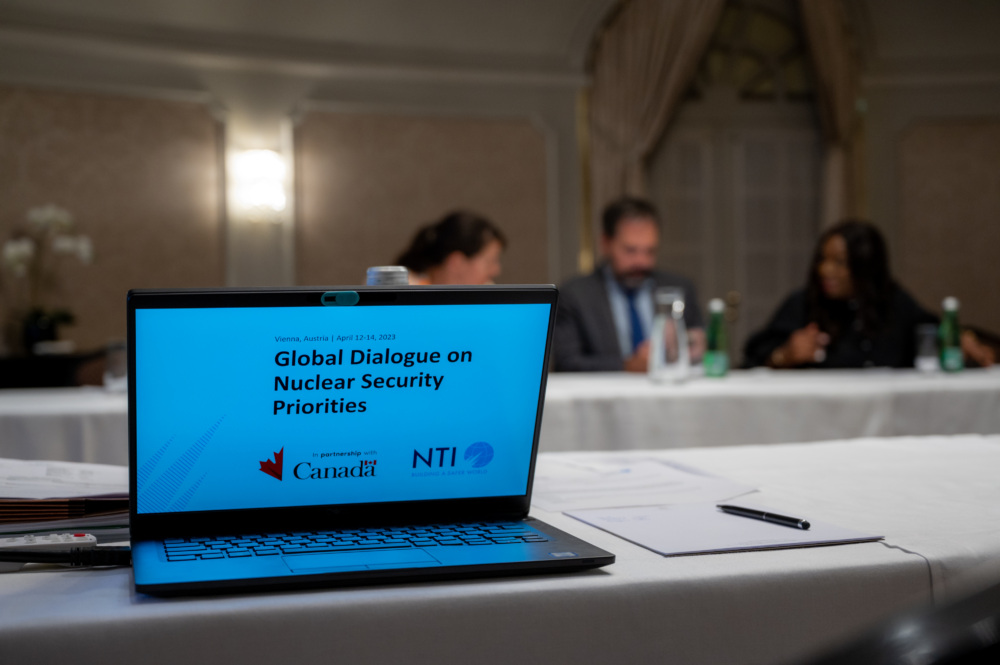
Joan Rohlfing
President and Chief Operating Officer, NTI
Security vulnerabilities in the nation’s nuclear weapons enterprise have made startling headlines in recent weeks. An 82-year-old nun and her two cohorts were found guilty of sabotage after breaking into Oak Ridge, Tenn.’s Y-12 nuclear complex, the nation’s main storage vault for weapons-usable highly enriched uranium. They breached a $150-million-a-year security system. In North Dakota, 17 officers charged with controlling nuclear missiles at Minot Air Force Base — home to 150 of the U.S. arsenal of 450 nuclear-tipped Minuteman 3 ICBMs — were stripped of their duties amid safety and security violations.
Congress has held hearings on these disturbing failures — and rightly so. Recalling the unintended 2007 flight of six nuclear-armed cruise missiles across several U.S. states, it’s clear that the United States needs to do more to uphold the solemn responsibility of making certain that our nuclear weapons and materials are effectively secured.
Just as Congress should hold the administration accountable, it needs to be held accountable as well. Congress must pass legislation that would complete the ratification of two critical international treaties designed to protect against the unthinkable: a terrorist with a nuclear weapon. Last week, the House of Representatives took the right step: passing the legislation again, after already doing so last year. It is past time for the Senate to take up its responsibility and act to increase security around some of the world’s deadliest nuclear materials.
The shortest path to a terrorist bomb would be for a terrorist organization to steal what it needs to make a nuclear weapon — only a soda can’s amount of plutonium or enough highly enriched uranium (HEU) to fill a five-pound bag of sugar. That’s why security matters.
The real question that emerges after the news from Y-12 and Minot is this: If the United States has such serious challenges with our nuclear security, what assurances do we have about security at the hundreds of sites with nuclear weapons-usable material in 27 countries around the globe? Some of those sites are well secured but potentially flawed, as in the United States. Many are not, leaving these materials vulnerable to theft or sale on the black market.
The fact is, we cannot answer the question. There is no global system in place for tracking, accounting for, managing and securing all weapons-usable nuclear materials. Instead, there is only a patchwork of agreements, guidelines and multilateral engagement mechanisms with numerous gaps and limitations that undermine global security as well as our confidence in the effectiveness of the system.
The Nuclear Security Summit process has brought needed attention to the global challenge of protecting nuclear materials and is beginning to close gaps in the patchwork.
But closing two of the biggest gaps will require, among other things, leadership from Congress to advance the International Convention for the Suppression of Acts of Nuclear Terrorism and the 2005 Amendment to the Convention on Physical Protection of Nuclear Materials. Without these actions, these agreements cannot take full effect, and the United States has less authority to urge other nations to do more — and much more needs to be done. Our leadership failure in this area has been noticed, and it hurts us.
The two agreements have support from our military leaders and bipartisan majorities in Congress: With the 2005 amendment to the Convention on Physical Protection of Nuclear Materials in force, states would be obligated to enact standards for protecting nuclear facilities and materials in domestic use, both while in storage and during transport, and to take criminal action against nuclear thieves, smugglers and saboteurs; the International Convention for the Suppression of Acts of Nuclear Terrorism commits states to criminalize acts of nuclear terrorism and promotes information sharing and cooperation on investigations and extraditions.
Passage of legislation necessary to complete ratification of these two treaties will enhance U.S. security, strengthen international counterterrorism and legal frameworks and encourage other nations to do the same.
In failing to ratify these treaties, the United States is dangerously out of line with other countries that also have nuclear weapons and nuclear materials — among them Russia, China, India and the United Kingdom, all of which have ratified both treaties.
Global nuclear security is only as strong as the weakest link in the chain. It is incumbent upon every country to do everything it can to strengthen the system that can protect us all. The United States should be leading this effort on every front. Failure to ratify these treaties is an embarrassment. Members of Congress have a responsibility — to their own constituents and to the rest of the world — to do everything possible to prevent nuclear terrorism.
Rohlfing is president of the Nuclear Threat Initiative. She served at the U.S. Department of Energy as senior adviser for national security to the secretary of Energy and as director of the Office of Nonproliferation and National Security. She also has served on the staff of the U.S. House Armed Services Committee and at the U.S. Department of Defense.
Sign up for our newsletter to get the latest on nuclear and biological threats.
To make good on their COP28 pledge, countries need a new approach to building, regulating, and financing nuclear technology.
Lessons Learned from 10 Years of the Global Dialogue on Nuclear Security Priorities
The NTI Index is recognized as the premier resource and tool for evaluating global nuclear and radiological security.


